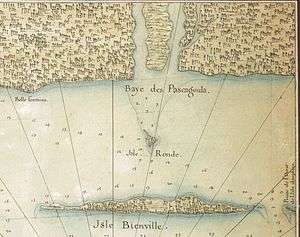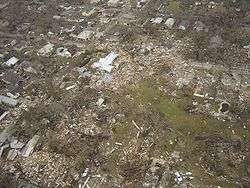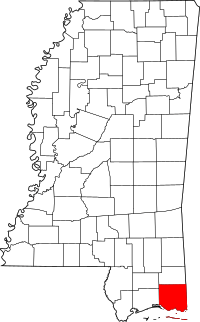Pascagoula, Mississippi
| Pascagoula, Mississippi | |
|---|---|
| City | |
| City of Pascagoula | |
|
Welcome sign on U.S. Route 90 | |
| Nickname(s): Mississippi's Flagship City | |
| Motto: "A Great Place to Live, Work & Play" | |
 Location of Pascagoula, MS | |
 Pascagoula, Mississippi Location in the United States | |
| Coordinates: 30°21′49″N 88°32′31″W / 30.36361°N 88.54194°WCoordinates: 30°21′49″N 88°32′31″W / 30.36361°N 88.54194°W | |
| Country | United States |
| State | Mississippi |
| County | Jackson |
| Government | |
| • Mayor | Dane Maxwell |
| Area | |
| • City | 18.2 sq mi (47.2 km2) |
| • Land | 15.2 sq mi (39.3 km2) |
| • Water | 3.0 sq mi (7.9 km2) |
| Elevation | 10 ft (3 m) |
| Population (2010)[1] | |
| • City | 22,392 |
| • Estimate (2016)[2] | 21,981 |
| • Density | 1,200/sq mi (470/km2) |
| • Urban | 50,428 (US: 497th) |
| • Metro | 382,516 (US: 137th) |
| Time zone | Central (CST) (UTC-6) |
| • Summer (DST) | CDT (UTC-5) |
| ZIP codes | 39567-39581 |
| Area code(s) | 228 |
| FIPS code | 28-55360 |
| GNIS feature ID | 0675480 |
| Website | City of Pascagoula |
Pascagoula is a city in Jackson County, Mississippi, United States. It is the principal city of the Pascagoula, Mississippi Metropolitan Statistical Area, as a part of the Gulfport–Biloxi–Pascagoula, Mississippi Combined Statistical Area. The population was 26,200 at the 2000 census. It is the county seat of Jackson County.[3]
Pascagoula is a major industrial city of Mississippi, along the Gulf Coast. Prior to World War II, the town was a sleepy fishing village of about 5,000. The population exploded with the war-driven shipbuilding industry. Although the city's population seemed to peak in the late 1970s and early 1980s as Cold War defense spending was at its height, Pascagoula experienced some new growth and development in the years before Hurricane Katrina. Today, Pascagoula is home to the state’s largest employer, Ingalls Shipbuilding, owned by Huntington Ingalls Industries. Other major industries include one of the largest Chevron refineries in the country; Signal International, an oil platform builder; and Mississippi Phosphates.
Naval Station Pascagoula was located on Singing River Island, and was homeport to several Navy warships, as well as a large Coast Guard contingent. However, Naval Station Pascagoula was decommissioned as part of the 2005 BRAC recommendations and ceased operations in 2006.
The city is served by three airports: Mobile Regional Airport, which is located in nearby Mobile, Alabama; the Gulfport-Biloxi International Airport, about 40 miles (64 km) west of Pascagoula; and the Trent Lott International Airport, located within Jackson County.
The mayor of the city is Dane Maxwell.
History
Early history

The name Pascagoula, which means "bread eater", is taken from a group of Native Americans found in villages along the Pascagoula River some distance above its mouth. Hernando De Soto seems to have made first contact with them in the 1540s, though little is known of that encounter. Pierre Le Moyne d'Iberville, founder of the colony of Louisiana, left a more detailed account from an expedition of this region in 1700. The first detailed account comes from Jean-Baptiste Le Moyne de Bienville, younger brother of Iberville, whom the Pascagoula visited at Fort Maurepas in present-day Ocean Springs, shortly after it was settled and while the older brother was away in France. There are few details that are certain about these peoples, except that their language seemed not to have shared an etymological root with the larger native groups to the north, the Choctaw particularly. Instead, their language seems more akin to that of the Biloxi or Natchez people, both of whom have been linked in this way to the Sioux, Crow, and Ho-Chunk. The territory of the Biloxi peoples seems to have ranged from the areas of what are now called Biloxi Bay to Bayou La Batre (Alabama) and twenty-five miles up the Pascagoula River, and then the Pascagoula people's territory seems to have ranged between some distance north of there to the confluence of the Leaf and Chickasawhay rivers.[4]
The first settlers of Pascagoula were Jean Baptiste Baudreau Dit Graveline, Joseph Simon De La Pointe and his aunt, the Madame Chaumont.
Modern history

The region changed hands over the next century, being occupied variously by the English, French, and Spanish until well after the American Revolutionary War. It did not come into the permanent possession of the United States until 1812, when it was added to the Mississippi Territory. At one point, for seventy-four days in 1810, Pascagoula was a part of what was known as The Republic of West Florida.[5] Pascagoula was incorporated as a village in 1892 and obtained city status in 1901. Today's downtown Pascagoula used to be the town of Scranton, Mississippi (incorporated in 1870) until the two towns merged in 1912.[6]
Hurricane Katrina

On August 29, 2005, Hurricane Katrina's 20-foot (6.1 m) storm surge devastated Pascagoula,[7] much like Biloxi and Gulfport and the rest of the Mississippi Gulf Coast.[8] Katrina came ashore during the high tide of 6:12AM, 2.1 ft (0.64 m) more.[9] Nearly 92% of Pascagoula was flooded. Most homes along Beach Boulevard were destroyed, and FEMA trailers are now an omnipresent sight. Due to the major media focus on the plight of New Orleans and Biloxi-Gulfport in the aftermath of Katrina, many Pascagoula citizens have expressed feeling neglected or even forgotten following the storm. Most Pascagoula residents did not possess flood insurance, and many were required to put their homes on pilings before being given a permit to rebuild. Additionally, TITANTubes (sometimes referred to as geotubes) were installed under the beach to serve as low profile dune cores to protect the evacuation route.
United States Navy officials announced that two Arleigh Burke-class guided missile destroyers that were under construction at Northrop Grumman Ship Systems in Pascagoula had been damaged by the storm, as well as the Amphibious assault ship USS Makin Island.
Hurricane Katrina damaged over forty Mississippi libraries, flooding the Pascagoula Public Library, first floor, and causing mold in the building.[10]
Point of interest
The United States post office in Pasagoula contains a mural, Legend of the Singing River, painted in 1939 by Lorin Thompson. Murals were produced from 1934 to 1943 in the United States through the Section of Painting and Sculpture, later called the Section of Fine Arts, of the Treasury Department. The mural was restored in the 1960s as the building became the Pasagoula Public Library. The building was damaged by Hurricane Katrina in 2005 and the mural was placed in storage. In 2010, it was re-installed at the new Pascagoula post office on Jackson Avenue.[11]
Geography

Pascagoula is located along Mississippi Sound, at the mouth of the Pascagoula River. According to the United States Census Bureau, the city has a total area of 18.2 square miles (47 km2), of which 15.2 square miles (39 km2) is land and 3.0 square miles (7.8 km2) (16.74%) is water.
Demographics
| Historical population | |||
|---|---|---|---|
| Census | Pop. | %± | |
| 1870 | 480 | — | |
| 1880 | 418 | −12.9% | |
| 1900 | 708 | — | |
| 1910 | 3,379 | 377.3% | |
| 1920 | 6,082 | 80.0% | |
| 1930 | 4,339 | −28.7% | |
| 1940 | 5,900 | 36.0% | |
| 1950 | 10,805 | 83.1% | |
| 1960 | 17,155 | 58.8% | |
| 1970 | 27,264 | 58.9% | |
| 1980 | 29,318 | 7.5% | |
| 1990 | 25,899 | −11.7% | |
| 2000 | 26,200 | 1.2% | |
| 2010 | 22,392 | −14.5% | |
| Est. 2016 | 21,981 | [2] | −1.8% |
| U.S. Decennial Census[12] 2013 Estimate[13] | |||
As of the census of 2000, there were 26,200 people, 9,878 households, and 6,726 families residing in the city. The population density was 1,726.4 people per square mile (666.4/km²). There were 10,931 housing units at an average density of 720.3 per square mile (278.0/km²). The racial makeup of the city was 67.15% White, 28.97% African American, 0.18% Native American, 0.97% Asian, 0.02% Pacific Islander, 1.67% from other races, and 1.04% from two or more races. Hispanic or Latino of any race were 3.89% of the population. There were 9,878 households, of which 34.5% had children under the age of 18 living with them, 44.6% were married couples living together, 18.8% had a female householder with no husband present, and 31.9% were non-families. 27.0% of all households were made up of individuals and 9.7% had someone living alone who was 65 years of age or older. The average household size was 2.52 and the average family size was 3.05.
In the city, the population was 26.9% under the age of 18, 12.0% from 18 to 24, 28.9% from 25 to 44, 20.4% from 45 to 64, and 11.9% who were 65 years of age or older. The median age was 33 years. For every 100 females there were 101.8 males. For every 100 females age 18 and over, there were 100.9 males. The median income for a household in the city was $32,042, and the median income for a family was $39,044. Males had a median income of $30,313 versus $22,594 for females. The per capita income for the city was $16,891. About 18.1% of families and 20.7% of the population were below the poverty line, including 31.4% of those under age 18 and 13.0% of those age 65 or over.
According to census 2010 Pascagoula has highest percentage of Puerto Ricans in Mississippi. Puerto Ricans make up nearly 5% of the city.
Education
The Pascagoula-Gautier School District serves Pascagoula.
Notable people
- Former Major League Baseball player and Mississippi Sports Hall of Fame member Sam Leslie (New York Giants and Brooklyn Dodgers)
- Former professional baseball player Kim Seaman (St. Louis Cardinals)
- Former professional wrestler Uncle Elmer (real name: Stan Frazier)
- It is the birthplace of well-known American singer and songwriter Jimmy Buffett,
- Christian recording star and comedian, David L. Cook
- NFL players Chuck Commiskey, Shane Matthews, Richard Harvey, Terrell Buckley, and Senquez Golson.
- Fred Cook, professional football player.[14]
- NBA forward Antonio Harvey
- Edgar Hull, co-found physician of Medical Center of Louisiana at New Orleans; born in Pascagoula in 1904 and died there in 1984.
- Major League Baseball players Harry "The Hat" Walker and Tony Sipp
- Ira B. Harkey Jr., editor and publisher of the Pascagoula Chronicle; won the Pulitzer Prize for his courageous editorials devoted to the processes of law and reason during the integration crisis in Mississippi in 1962.
- Charles Sellier Jr., television and film producer, including The Life and Times of Grizzly Adams[15][16]
- Lynn Thomas, NFL player for the San Francisco 49ers
- Brent Anderson, country music singer
- Steve Bowman, NFL player[17]
- Sarah Thomas, first female NFL official.
- Aaron Jones (basketball)
Twin city
-
 – Chico, California (U.S.) 2005[18]
– Chico, California (U.S.) 2005[18]
In popular culture
Pascagoula is the setting for Ray Stevens' novelty song "Mississippi Squirrel Revival".[19]
Jimmy Buffett wrote and performs a song called "Pascagoula Run".[20]
See also
References
- ↑ "American FactFinder". United States Census Bureau. Retrieved 2014-09-10.
- 1 2 "Population and Housing Unit Estimates". Retrieved June 9, 2017.
- ↑ "Find a County". National Association of Counties. Retrieved 2011-06-07.
- ↑ Cain, Cyril Edward: "Four Centuries on the Pascagoula", vol. 1, pages 19–21. 1953
- ↑ Cain, Cyril Edward: "Four Centuries on the Pascagoula", vol. 1, pages 47–49. 1953
- ↑ "Archived copy". Archived from the original on June 23, 2009. Retrieved 2009-06-18.
- ↑ "National Weather Service Forecast Office – Mobile/Pensacola." NOAA. July 7, 2006.
- ↑ "Tropical Cyclone Report, Hurricane Katrina." (post-analysis) National Hurricane Center. revised August 10, 2006.
- ↑ "2005 NOAA Tide Predictions: Pascagoula, Mississippi Sound" (2005), tide on August 29, 2006, NOAA, web:NOAA-tide-tables.
- ↑ "Archived copy" (PDF). Archived from the original (PDF) on October 31, 2007. Retrieved 2009-04-24.
- ↑ "Mural returns to Pascagoula Post Office". Blog.gulflive.com. Retrieved 20 January 2015.
- ↑ United States Census Bureau. "Census of Population and Housing". Retrieved October 23, 2013.
- ↑ "Population Estimates". United States Census Bureau. Archived from the original on May 22, 2014. Retrieved 2014-09-10.
- ↑ "Fantasy News, Fantasy Leagues, Player Projections, Cheat Sheets, Player Rankings, Draft Guides - RotoWire.com". Databasefootball.com. Retrieved May 2, 2017.
- ↑ Hevesi, Dennis (February 4, 2011). "Charles Sellier Jr., Creator of ‘Grizzly Adams’, Dies at 67". New York Times. Retrieved February 11, 2011.
- ↑ Dumas, Michael (February 8, 2011). "Charles Sellier Jr., creator of 'Grizzly Adams', dies at 67". Press-Register. Retrieved February 11, 2011.
- ↑ "STEVE BOWMAN". profootballarchives.com. Retrieved December 12, 2014.
- ↑ "Chico News & Review - Chico gets a Southern sister - News - Local Stories - October 27, 2005". Newsreview.com. 2005-10-27. Retrieved 2017-05-02.
- ↑ Whitburn, Joel (2012). Hot Country Songs 1944 to 2012. Record Research, Inc. p. 322. ISBN 978-0-89820-203-8.
- ↑ "Pascagoula Run". Pascagoula Run. Retrieved August 8, 2017.

